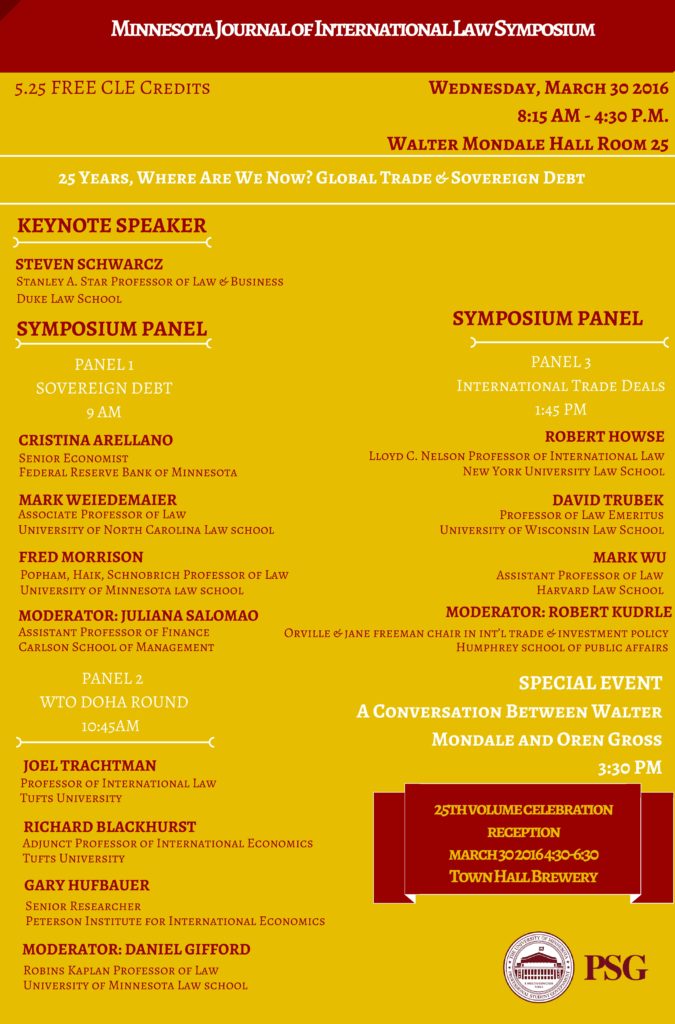Symposium Sam Engel shared the following post in anticipation of our 2016 Symposium: 25 Years, “Where Are We Now? Global Trade & Sovereign Debt.” Learn more here, register, and view schedule here.
Priorities in Global Trade: India and Neoliberalism
Sam Engel, MJIL Symposium Editor
Last summer India’s frustration resulted in a months-long protest of the WTO’s Trade Facilitation Agreement (TFA). The protest stemmed from a previous agreement which constrained India’s ability to subsidize and stockpile food. The constraint imposed would likely be violated by a successful implementation of Indian’s National Food Security Act (Right to Food Act)-a herculean effort to provide subsidized food to more than 10% of the global population.
India is malnourished. According to the World Bank, India’s malnourishment most closely approximates Mali and Zimbabwe. Yet, despite this fact, India remains poised to assert itself on the global scene in the not too distant future. This combination of severe problems and impressive promise is further illuminated by a society that is incredibly diverse politically, culturally, and economically. Politically, India typically has fifteen or more parties that enjoy at least 1% representation in one of the legislative houses. The Indian constitution even contains a schedule listing twenty-one officially recognized languages that are spoken by at least one million people-thirteen of them are spoken by at least ten million. Economically, some areas have made strong profess, while others possess economic indicators similar to Sub-Saharan Africa. Governing this type of society requires extreme flexibility-flexibility the West would rather not allow.
It has been about thirty years now that neoliberalism has been the dominant theory that Western scholars have prescribed for developing countries. Yet a real success story is lacking; the countries (“Asian Tigers”) that have most recently ascended to rival the major Western nations adopted their own unique, customized approaches to development. And a quick glance at the list of countries developing the quickest will reveal a list of countries that, for the most part, have rejected the approach of neoliberalism.
Yet, the West, despite the mounting evidence that there is no one-size fits all approach to economic development, still would prefer to force their approach on India. A large Anglo-American influence and a potentially massive economy might allow the West to exert an indirect influence in Eastern affairs. Yet, in India, we are not just talking about economic development-there is a human development factor that might be more pressing in India than any other nation globally. Unlike China, India’s population is (has) not slowed dramatically. Unlike China, India lost a significant amount of its professional class to emigration prior to achieving economic development. And unlike China, India is not being afforded the opportunity to attempt to build their economic, and society, in a customized, sustainable way.
The entire Western world needs to decide what its priorities are for global trade moving forward. We need to be careful that attempts to inspire economic development do not exasperate existing problems, are conscious of human development issues, and can be flexibly applied to nations with different concerns. This is true for all nations-but, for a country like India, which in itself is as diverse as many sub-continents, even a customized policy crafted by the West will not adequately address the relevant issues.
After centuries of colonization, failed IMF policies in Africa, and economic stagnation tied to neoliberalism in Latin America and Eastern Europe, it is time to take a step back and allow India to carve their own unique, culturally sensitive role in the global economy. The evidence is mounting and the stakes are as high as ever. The argument that free trade should take priority over an attempt to provide food to hundreds of millions of malnourished people simply cannot be taken seriously. Even if India’s ambitious program does not succeed-it is simply not the right of the West to prevent the task from being attempted.

